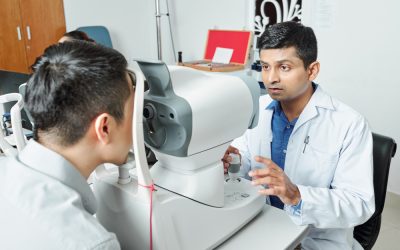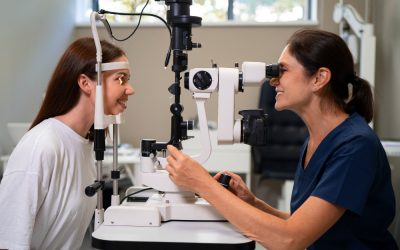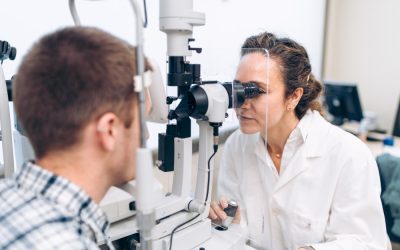Essential Post-op Precautions After Lasik Eye Surgery: A Complete Guide

After undergoing Lasik surgery, adhering to certain post-op precautions is crucial. These precautions are essential for reducing complications, thus optimizing vision outcomes. Recovery isn’t just about resting the eyes post-surgery. Instead, it’s an ongoing process of taking care of yourself meticulously to avoid setbacks and ensure long-term vision health.
Understanding Lasik Eye Surgery: What You Need to Know
Lasik is a type of surgery to fix common vision issues. A laser changes the shape of your cornea, helping your eye to see better. This often means you won’t need glasses or contacts.
Lasik isn’t right for everyone looking to improve their vision. You must be 18 or older with stable vision for a year. Some health issues or medications can rule you out. Your eye doctor needs to check if you’re a fit.
Lasik can boost your life by freeing you from eyewear. After surgery, most folks get back to normal in days, feeling a great quality of life change.
Why Post-Operative Care Is Crucial
Proper care after surgical procedures like Lasik is essential for success. Healing is quicker when patients follow all the recommended health guidelines.
Skipping post-op instructions can result in several unwanted complications. Patients who neglect recovery advice might experience longer healing or even serious vision issues.
Immediate Post-Surgery Care: First 24 Hours
The first 24 hours after Lasik are crucial for healing. You’ll need to be cautious during this time to ensure a smooth recovery process. It’s essential to protect your eyes which are incredibly tender now.
- Do:
- Rest by keeping your eyes closed as much as possible.
- Use medications like antibiotic and anti-inflammatory drops, as prescribed by your doctor.
- Wear the protective eye shields given by your clinic.
- Don’t:
- Rub your eyes under any circumstances throughout this initial period.
- Participate in strenuous activities that could affect your peace.
- Use screens or devices until you get the go-ahead from the doctor.
Rest aids in the eyes’ recovery and is super important after surgery. Sleeping helps your eyes heal and makes you feel better. The eye drops are important too, keeping infections at bay and reducing swelling, aiding the healing process effectively.
Key Lifestyle Changes for Initial Week
In the first week after having Lasik surgery, it’s important to avoid certain actions to help your eyes heal. Don’t put on makeup near your eyes to lessen infection chances. Keep water and soap out of your eyes when washing your face. Avoid sports and physical activities that might harm your healing eyes.
Changing daily habits can be helpful. Maintain a clean living space free of dust or other eye irritants. Investing in protective eyewear for daily activities could be beneficial. Always wear sunglasses outside, as sunlight can impact your eye’s healing process.
Set an alarm for taking eye drops so you don’t forget. Stick to the schedule your doctor provides for better results and avoiding missed doses. Wearing eye shields while sleeping is vital to prevent rubbing or putting pressure on your eyes overnight. Make sure the shields fit comfortably and stay in place all night long.
Look Out for Normal Symptoms and Safety Signs
It’s common to face symptoms like dry eyes and blurry vision. These are normal after Lasik surgery and typically fade over time.
However, stay vigilant and watch for any serious warning signs. If there is intense pain or you start losing vision, see your doctor right away. Quick action helps avoid future complications.
Most side effects are short-term and will disappear as the eyes heal. With good care, you’ll soon see clearly and have long-lasting results.
Managing Eye Care: Weeks 2 to 8
Begin incorporating everyday activities gradually, paying attention to how you feel. Take breaks if you experience any discomfort or if your eyes feel strained. If anything unusual happens, it’s important to contact your doctor immediately.
Wearing sunglasses is crucial, even when the surgery is weeks behind you. Look for sunglasses that block harmful UV rays to protect your healing eyes effectively. If you’re planning to play sports or engage in physical activity, it’s a good idea to wear protective goggles. They help shield your eyes from unexpected impact.
When it comes to using screens, practice caution by checking the time spent on devices regularly. Make sure to rest your eyes after every 20-minute session with screens. Adjust screen brightness to a comfortable level so it causes less eye strain. Also, remember to use the lubricating drops as advised by your eye care provider.
Long-term Precautions and Care for Lasting Results
Maintaining eye health after a procedure is very important. Regular eye checks help track your recovery and can catch problems early. Your care plan should include keeping your eyes clean and using protection.
Avoid high-impact sports as they might harm your eyes. After the procedure, ask your doctor about taking part in such activities. Wear protective gear if you must engage, even many weeks later.
Follow-up visits to your eye doctor are very important. These check-ups find and fix any issues early so that your eyes continue to heal well and maintain clear vision for a long time.
Practical Tips for Living Post-Lasik
A balanced diet is crucial for optimal recovery following Lasik eye surgery. It’s important to include foods rich in nutrients supporting eye health. Omega-3 fatty acids found in fish, flaxseeds, and walnuts help reduce inflammation after surgery. Antioxidants such as vitamins C and E can repair tissue and guard against issues. Hydration plays a pivotal role in recovery from laser eye surgery. Drinking 8 to 10 glasses of water daily helps maintain eye moisture, fighting off dry eyes. Plain water, herbal teas, and water-rich fruits like watermelon meet your hydration needs.
Physical activity remains important, but choose gentle exercises post-Lasik eye surgery. Light walking or mild yoga keeps you fit without risking surgical effects. Avoid activities with bending over, jerking motions, or too much exertion. This reduces strain on your healing eyes during the recovery process. Always consult your doctor to get an exercise plan fitting your recovery phase.
Caring for your eyes post-surgery means cutting down on strain, especially if you work long hours with screens. Using the 20-20-20 rule can significantly benefit recovery—every 20 minutes look 20 feet away for 20 seconds. Lowering your screen below eye level cuts neck strain and eye fatigue. An anti-glare screen filter can reduce glare, which adds comfort to healing eyes.
Avoiding Complications: Signs to Monitor
Post-op precautions after Lasik eye surgery can help prevent issues. Always stay alert for signs like increased redness or eye discomfort. Unusual tearing or vision changes may mean something isn’t right. Don’t wait to get professional medical help for these concerns.
It’s important to understand typical symptoms during recovery from Lasik surgery. Dryness and slight irritation are often common and temporary. However, if severe discomfort persists, seek medical advice right away. Timely care plays a key role in avoiding potential complications.
Debunking Myths About Lasik Recovery
Many people think Lasik surgery requires a long recovery time. However, most patients heal quickly and can see better within days. This debunks the myth that vision stays blurry for weeks after the procedure ends. Studies also show that any side effects of laser eye surgery are quickly managed with the right care routine.
Patients often share their Lasik laser eye surgery side effects stories to ease others’ worries. Take John’s experience as an example; he could not wear contacts due to discomfort but wanted to improve his vision. Fearing a lengthy healing period, John was surprised when clarity returned soon after the surgery. Stories like John’s show that lasik eye surgery gone wrong stories are rare when following all medical guidelines.
Environmental Considerations for Healing
The environment plays a major role when healing after undergoing Lasik eye surgery. Pollution and sunlight can worsen the healing process in the eyes. It’s helpful to use humidifiers to keep air moist when your home cooling or heating is in use. Consider applying UV-protective films on your windows to reduce intense sunlight. Using curtains can also protect your eyes from direct sunlight during recovery, ensuring a healthy environment for your eyes.
Creating smoke-free environments is crucial for a smooth recovery from laser eye surgery. Dust can irritate your eyes, so regular cleaning helps promote a dust-free home which supports healthy eyes post-surgery. Smoking is particularly harmful and should be avoided, as cigarette smoke greatly irritates sensitive, healing eyes. These sustainable practices and precautions help create optimal conditions for nurturing recovering eyes, aiding their recovery after the surgical procedure.
Recognizing and Managing Lasik Side Effects
Common side effects for laser eye surgery include dry eyes, halos, or glare. These symptoms usually subside over time. While unsettling, remember these typically temporary post-op effects require patience. Stay focused on prescribed remedies, knowing that the healing journey progresses toward clearer vision.
Managing Lasik eye surgery after effects can reduce temporary symptoms. Use lubricant drops to help ease eye dryness. Shield your eyes from glare by wearing quality polarized sunglasses outside. Following these steps supports a smoother recovery and eases your healing experience.
Comprehensive Guide to Post-Surgery Diet and Nutrition
Nutrition is key to healing well after eye surgery, making recovery quicker. Balanced, healthy meals are important for getting better results long-term. Eat carrots, spinach, and almonds rich in vitamin A and zinc. This dietary approach promotes good eye health as a part of post-op care.
Changing your meals for better eye health doesn’t need to be hard. Focus on simple recipes with salmon and berry salads full of nutrients. Preparing these meals quickly will help you stick to these healthy changes. These adjustments help you heal faster after surgery.
Drinking enough water is another big part of healing right after an eye surgery. Staying hydrated keeps the eyes moist and can lessen dryness symptoms. You can enjoy water by adding fresh fruits or sipping herbal teas. This habit reduces side effects and leads to smoother recovery times.
Your journey to clearer vision doesn’t end with surgery—it begins with proper care. Trust Global Eye Hospital for expert post-LASIK guidance, personalized follow-ups, and comprehensive support to ensure a smooth and speedy recovery.
👁️🗨️ Book your post-op consultation today and see the world brighter tomorrow!
Your eyes deserve the best care—Global Eye Hospital is here for you every step of the way.
#PostLASIKCare #ClearVision #GlobalEyeHospital #EyeHealth #LASIKRecovery


